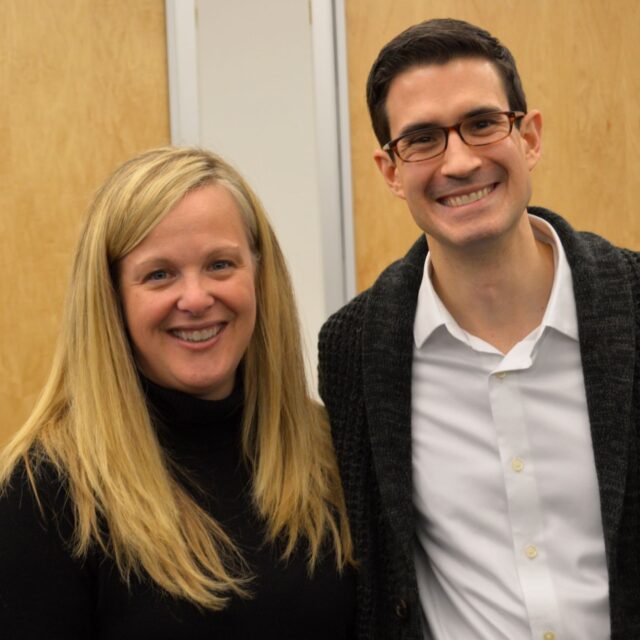Write. Edit. Publish … Celebrate!
On November 13, members of the School of Public Policy and Urban Affairs came together to celebrate the work of seven faculty members who published thought-provoking and award-winning books in 2017.
On November 13, members of the School of Public Policy and Urban Affairs came together to celebrate the work of seven faculty members who published thought-provoking and award-winning books in 2017.
Below are photos from the event as well as brief synopses of all eight books. (Note: Click images to enlarge them.)


Africa’s Natural Resources and Underdevelopment: How Ghana’s Petroleum Can Create Sustainable Economic Prosperity
Author: Kwamina Panford, Associate Professor of Cultures, Societies and Global Studies
This book explores how African countries can convert their natural resources, particularly oil and gas, into sustainable development assets. Using Ghana, one of the continent’s newest oil-producing countries, as a lens, it examines the “resource curse” faced by other producers and demonstrates how mismanagement in those countries can provide valuable lessons for new oil producers in Africa and elsewhere.
Cities for Profit: The Real Estate Turn in Asia’s Urban Politics
Author: Gavin Shatkin, Associate Professor of Public Policy and Architecture; Director, MS in Urban and Regional Policy; Director, Asian Studies Program
This book provides an examination of the massive, privately built, planned urban developments—a phenomenon of urban real estate megaprojects in Asia—that are controversial and have considerable social and economic impacts. (Click here to read an interview about this book.)
Creating Low Carbon Cities
Authors: Matthias Ruth, Director and Professor, School of Public Policy and Urban Affairs; Shobhakar Dhakal, Asian Institute of Technology in Thailand
Topics of debate over low carbon cities that are underway globally are addressed in this book along with the key factors required for creating low carbon cities. Challenges and opportunities in creating these cities are discussed.
Feeding Cities: Improving local food access, security, and resilience
Author: Christopher Bosso, Professor of Public Policy; Director, Master of Public Policy and Master of Public Administration Programs
This book is a cross-disciplinary approach to urban food system sustainability with analysis of specific experiences relevant to local food systems. This book addresses issues of food access and public health, and the use of zoning to restrict the density of fast food restaurants in hopes to reduce obesity. Other topics such as reducing food waste and improving food access are also discussed.
Framing the Farm Bill: Interests, Ideology, and Agricultural Act of 2014
Author: Christopher J. Bosso, Professor of Public Policy; Director, Master of Public Policy and Master of Public Administration Programs
This book dives into federal agricultural policy—its history, present state, and the effects that federal legislation has on farming practices, the environment, and diet.
Next in Line: Lowered Care Expectations in the Age of Retail – and Value-Based Health
Author: Timothy J. Hoff, Professor of Management, Healthcare Systems, and Public Policy
Timothy J. Hoff examines the doctor-patient relationship in the context of the impact of efficiency-driven innovation and retail-care models on physician mindset and patient experience. His findings are that the experience is impersonal, leaving all sides underwhelmed and overstressed. (Click here to read an article about this book.)
Service-Learning Through Community Engagement: What Community Partners and Members Gain, Lose, and Learn From Campus Collaborations
Author: Lori Gardinier, Director and Teaching Professor, Human Services Program
Collaborations between campus and community are generally viewed positively. This book studies the partnership from the perspective of the community. The impacts, positive and negative, from service-learning arrangements are discussed with the support of concrete data. This book features chapters written by Rebecca Riccio, director of Northeastern’s Social Impact Lab, and Emily Mann, teaching professor of human services.
Waste in Information: Infrastructure Legibility and Governance
Author: Dietmar Offenhuber, Assistant Professor of Public Policy and Urban Affairs
In an award-winning and thought-provoking monograph, Dietmar Offenhuber challenges the way practitioners think about waste, infrastructure and urban governance. He explores how data can be sourced, used and governed to improve cities. He looks at three waste tracking projects in São Paulo, Seattle and Boston to introduce the concept of infrastructure legibility. (Click here to read an interview about this book)












